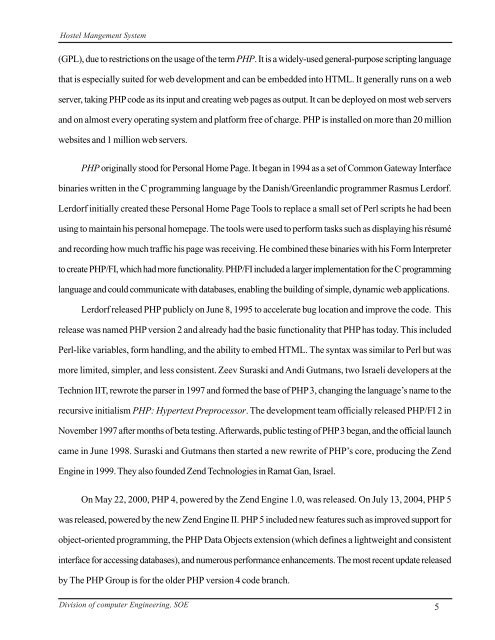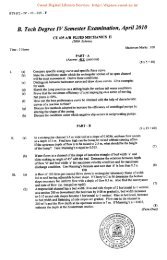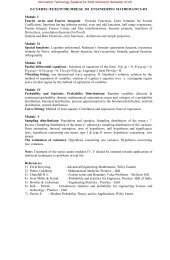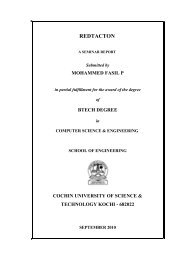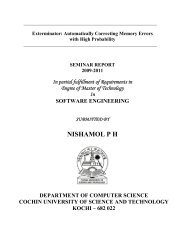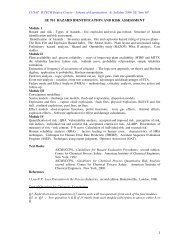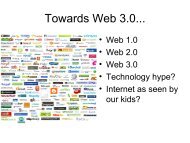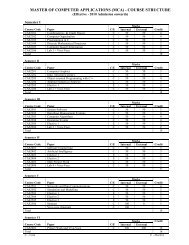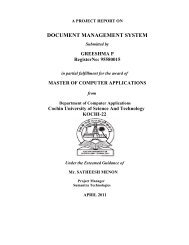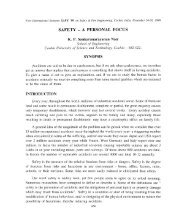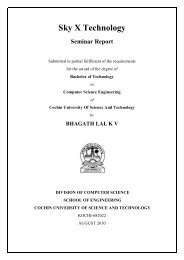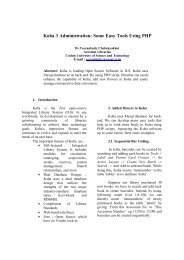hostel management system - DSpace at CUSAT - Cochin University ...
hostel management system - DSpace at CUSAT - Cochin University ...
hostel management system - DSpace at CUSAT - Cochin University ...
Create successful ePaper yourself
Turn your PDF publications into a flip-book with our unique Google optimized e-Paper software.
Hostel Mangement System<br />
(GPL), due to restrictions on the usage of the term PHP. It is a widely-used general-purpose scripting language<br />
th<strong>at</strong> is especially suited for web development and can be embedded into HTML. It generally runs on a web<br />
server, taking PHP code as its input and cre<strong>at</strong>ing web pages as output. It can be deployed on most web servers<br />
and on almost every oper<strong>at</strong>ing <strong>system</strong> and pl<strong>at</strong>form free of charge. PHP is installed on more than 20 million<br />
websites and 1 million web servers.<br />
PHP originally stood for Personal Home Page. It began in 1994 as a set of Common G<strong>at</strong>eway Interface<br />
binaries written in the C programming language by the Danish/Greenlandic programmer Rasmus Lerdorf.<br />
Lerdorf initially cre<strong>at</strong>ed these Personal Home Page Tools to replace a small set of Perl scripts he had been<br />
using to maintain his personal homepage. The tools were used to perform tasks such as displaying his résumé<br />
and recording how much traffic his page was receiving. He combined these binaries with his Form Interpreter<br />
to cre<strong>at</strong>e PHP/FI, which had more functionality. PHP/FI included a larger implement<strong>at</strong>ion for the C programming<br />
language and could communic<strong>at</strong>e with d<strong>at</strong>abases, enabling the building of simple, dynamic web applic<strong>at</strong>ions.<br />
Lerdorf released PHP publicly on June 8, 1995 to acceler<strong>at</strong>e bug loc<strong>at</strong>ion and improve the code. This<br />
release was named PHP version 2 and already had the basic functionality th<strong>at</strong> PHP has today. This included<br />
Perl-like variables, form handling, and the ability to embed HTML. The syntax was similar to Perl but was<br />
more limited, simpler, and less consistent. Zeev Suraski and Andi Gutmans, two Israeli developers <strong>at</strong> the<br />
Technion IIT, rewrote the parser in 1997 and formed the base of PHP 3, changing the language’s name to the<br />
recursive initialism PHP: Hypertext Preprocessor. The development team officially released PHP/FI 2 in<br />
November 1997 after months of beta testing. Afterwards, public testing of PHP 3 began, and the official launch<br />
came in June 1998. Suraski and Gutmans then started a new rewrite of PHP’s core, producing the Zend<br />
Engine in 1999. They also founded Zend Technologies in Ram<strong>at</strong> Gan, Israel.<br />
On May 22, 2000, PHP 4, powered by the Zend Engine 1.0, was released. On July 13, 2004, PHP 5<br />
was released, powered by the new Zend Engine II. PHP 5 included new fe<strong>at</strong>ures such as improved support for<br />
object-oriented programming, the PHP D<strong>at</strong>a Objects extension (which defines a lightweight and consistent<br />
interface for accessing d<strong>at</strong>abases), and numerous performance enhancements. The most recent upd<strong>at</strong>e released<br />
by The PHP Group is for the older PHP version 4 code branch.<br />
Division of computer Engineering, SOE 5


